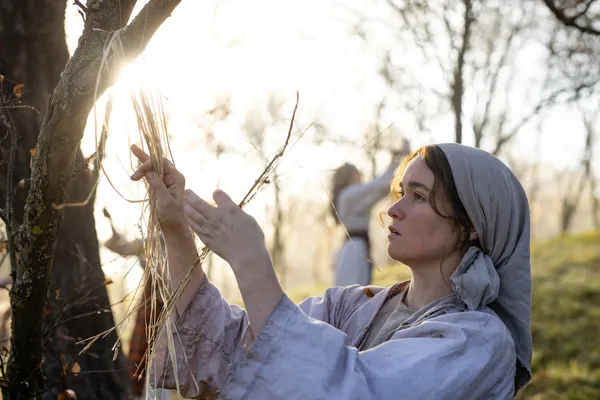 |
| Alice Englert in You Won't Be Alone Photo: Branko Starcevic / Focus Features |
Perhaps the greatest pleasure of working as a film journalist is discovery. Every now and again, a new talent emerges to breathe fresh life into the art, exploring ideas onscreen in a way which expands and enriches the cinematic language rather than simply drawing on what has been done before. Macedonian Australian director Goran Stolevski is such a talent, and his début film, You Won’t Be Alone, has won over some of the most jaded people in the business.
It’s the story of a pace made between a desperate mother and a vengeful witch, or ‘wolf eatress’, as she is referred to throughout. Naturally the mother’s attempts to trick the witch fall short, resulting in her taking Nevena, a teenage girl who has grown up in seclusion, and trying to make her into an apprentice. The training doesn’t altogether stick and the girl ends up finding her own path, which involves taking over the bodies of a series of people (who die just beforehand, or as a result) and inhabiting their lives, becoming more human herself in the process – all whilst the older witch watches her from a distance, made increasingly bitter by envy. When I met Goran I asked him if the witches, their magic and their lifestyle were his own invention or based on traditional tales.
“It’s literally all made up!” he declares. “I always had a sense of I wanted to do something that has a horror premise set in this particular time and place, and initially my instinct was to look at whatever folktales I could track down from the region. None of the ones I found were very inspiring. There weren’t that many of them that were recorded, you know? These people were busy surviving in a very difficult time and place. They didn't really write that much.
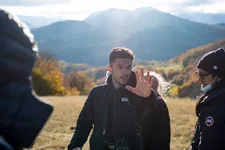 |
| Goran Stolevski on set Photo: Branko Starcevic / Focus Features |
“Then I did a lot of historical research. I knew I wanted to do something revolving around witches. And just coming across the fact that historically, in Eastern Europe, as it was in Western Europe, women who were accused of witchcraft were accused of taking the shape of another human being or animal,. That's the element that made everything else click. I wanted to make everything else as ordinary, as day to day life as possible, apart from just that one element. So most of the research went into what the day to day life was like, what it felt like. I wanted it to feel like it comes from traditional superstition. And I was very happy when all the Serbians I was working with assured me that it came from a legend or from something very specific.” He laughs. “It's all made up.”
We talk about the two different witches featured in the film and I ask if he sees the hostility on the part of the older one, Old Maid Maria, as stemming not so much from the fact she’s a witch as from the trauma which she has previously experienced at the hands of angry villagers.
“I see them as two different energies,” he says. “Obviously, in traditional terms one would be a sinister antagonist, but I understand intensely where she comes from, and I don't feel like her feelings are less valid. I think at that time and place, I probably would have behaved a lot like her. I mean, this movie is my brain split between two people essentially. To me, that is the heartbreaking moment in the film, when she says ‘Why is it so easy for you?’ because it’s probably the first time she openly admits that she wanted something like what Nevena ends up having, and that's what kills me about that.
“In terms of who she is and how she behaves, I think she's just someone who's trying to protect herself after obviously going through what she's gone through. And you know, as much as what she does is unconscionable and violent, and so on and so forth, I think her feelings are very valid. That's why she becomes the protagonist for a little bit of the film, I want to honour that as well. Her inner voice is very different from Nevena’s inner voice and I think the shape of their words also reflects why one has been able to survive, and still retain that capacity for joy and beauty, and why it was crushed tragically in the other one. So to me, they're both very valid ways of looking at the world.”
Does it help Nevena, perhaps, that her experiences during the film give her a second chance at childhood?
“I think the fact that she didn't know any better for many years of the worst traumas she had to go through is what actually protected her, ironically. And then that moment when you realise ‘Wait, it can be like this..?’ – it's kind of heartbreaking, but you're also in a place of strength where you've kind of overcome the worst of it, and you're here. That's what I wanted to capture, essentially.
“It's not autobiographical, but you know, there’s feelings I’ve gone through and experiences I’ve gone through. and I think what protected me is that I didn't know better, I didn't have the context of like, ‘Wait, there's an alternative,’ or ‘I don't have to go through this,’ but the fact that I didn't know better protected me, essentially so that I’d lived through certain things by the time I realised that they were actually traumatic, or, you know, or that other people didn't have to go through this. I think that there was a certain protection in that ignorance, and I think that that character and journey came from those feelings.”
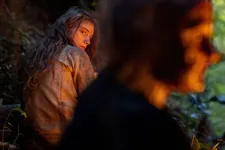 |
| Sara Klimoska and Anamaria Marinca Photo: Branko Starcevic / Focus Features |
Nevena spends her childhood in a cave, which means that when she emerges from it, she's seeing the world for the first time. I ask Goran how he approached putting himself and his star, Sara Klimoska, in that position.
“Sara Klimoska is a little bit of a miracle,” he responds. “I work from a very instinctive place. I shape and develop things from this place of logic and, I guess, in a rational way, but I mainly direct from an instinctive central place. Even writing and even editing happens from a very creative, sensual place. And when I'm directing, I usually put myself as much as possible in the emotional state of what the character is going through.
“I don't want to go too deeply into this, but I feel like the feeling of living in a prison without realising you're living in a prison is very familiar to me. The feeling of living a very deprived life without realising you're living a deprived life, and then suddenly breaking through that net or barrier, and then kind of having a different context. Again, it's a very intensely primal place a feeling I can understand. And I was kind of working from there, I think.
“When I'm on set, looking at the monitor, and I'm feeling these things and thinking them, when I'm talking to someone, like the actors, I'm not saying these thing but I'm in an emotional state that I think is communicated instinctively. Anamaria [Marinca, who plays Maria] actually pointed out that the way I look at the monitor while I'm shooting is apparently very specific to me, and then one of the other actors I've worked with on a short film was like, ‘Oh my God, yeah, I noticed that as well.’ I think that comes from the fact that I am in this emotional state that is communicated without words.
“I don't really pry into what what brings Sara to particular feelings. What happened a few times was while they were setting up the shot, she was in the place that the scene begins from – she knows she has complete freedom to move around anywhere, we created 360 degrees – but she knows the shape of the story and the shape of the scene. I usually don't say cut until well past the point where the scene is definitely finished on the page. But sometimes we're setting up the scene and something is happening in her eyes that I'm like, ‘I don't give a shit about the light and the camera focus, you're rolling right now.’
“Everybody's silent for shooting, and I don't say action, Sara just knows I'm filming. And it takes over. She can stay in the same spot for as long as she wants. There's no pressure to launch the scene. But something is happening that is outside of words, and often outside of what we can reasonably, rationally understand. You know, it comes from inside the body, but I think there's a limit to how much we can understand ourselves still. I'm hunting for those moments. I'm usually interested in capturing things so that they feel like they're found rather than staged. And a lot of times, that means you kind of have the premise of what's about to happen, but you don't know where it's going to take you. I think if you know where it's going to take you, it's usually going to be something very bland and cliched, so I try to avoid that.
“There was a lot of freedom to build on what was there [in the script]. And even in the edit, there were things that were reshaped, because I'm looking for new nuances and depths to add as much as possible. But I think a lot of the things that look improvised are actually in the script. It was not a heavily structured screenplay, but every syllable in the dialogue, you know, I was very careful. I'm careful about punctuation, because the punctuation affects the feeling the actor has when they're reading it, and unconsciously shapes the performance before I even get to speak to them. So it wasn't quite written as what's on screen, but it's quite close to the script.
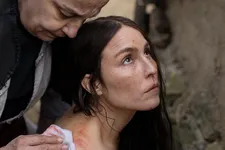 |
| Noomi Rapace Photo: Branko Starcevic / Focus Features |
“Maybe 95% of the voiceover was actually recorded in advance, and then when I edited it, we recorded maybe four of the lines, because the feeling in that stretch of the movie had changed. It's still literally what was written, but the feeling changed, the emotional temperature had changed, so we had to rerecord that just to reflect that, essentially. I think that's pretty much the film as well: probably 95% of it was written and then 5% was improvised. And then little bits were tinkered with to bring out nuances that I hadn't caught. A lot of them were actually around the section where she's a man. It became a little more about connecting on a level of feeling rather than just hijinks.” He laughs.
How did he achieve a consistency of performance with five different actors playing Nevena at different times? It wasn’t by having them spend time together, he reveals.
“Some of them still haven't met each other because they were in the country at different times, just because of the nature of filmmaking. Sara was there for several weeks of pre-production as well, and so she was well versed in every aspect of the film. And then as people were arriving, she was speaking to them, as well as me, to just fill them in on what she'd done, and they would listen to the voiceover. We had a reference video of Genie Wiley, who's a girl who was raised in captivity in America in the Fifties and Sixties. There's a lot of footage, but it was just one video where she's just walking in the garden, and her gait and body language was just so evocative that you kind of don't need words, you can just show that and you understand why and how these things happened.
“I know Sara found that very helpful, and then she showed that to the actors as they were coming in. But a lot of them had absolute freedom in terms of building on the character I wanted, you know, a little bit of Noomi [Rapace], and with Carloto [Cotta] the same thing. They're really remarkable as people, you know, if you ever have the chance to meet them. I wanted to preserve some of that as well. And it also helps to make sure that the character isn't static, that she evolves in every iteration. That was very important to me. So there's enough of a through line, and then they were there to make sure that it's someone that grows.”
I mention that actors often tell me that characters who don’t speak actually offer them more room to explore and practise their craft.
“Yeah, absolutely. I mean, it was written by their individual moments and gestures you cannot write. And yeah, like I said, we would try to create like a 360 degree space for them to move around. They have the premise, they know roughly what's written. They don't have to do everything that's written. But if it feels right in the moment, do it. Where you take me, I will find a way with the camera, don't worry. I'm often talking to the cinematographer during the scene while we're shooting, during the take. I'm also often talking to the actors in terms of ideas for where the scene could go, and then you find you come across moments that you couldn't find, and things that aren't capturable in scripts.
“Weather wise, we were exceptionally lucky. Out of the 36 days of filming, there was only two that had any rain, and it's autumn, going into winter, in the Balkans, which is, you know, a volatile time at best. Apart from the cave scenes, most of it was shot in the village of Pokrevenik, which is in southern Serbia. It's about a half hour drive from town and then within the village it's almost uninhabited now, but there's still some people here and there, and then structures a little bit further out of it, and then woods all around. There was just enough for us to shoot pretty much basically all of the scenes just in that particular region, and around the rivers in that region as well.
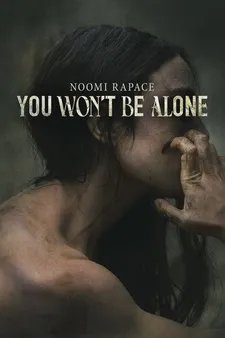 |
| You Won't Be Alone poster |
“On a practical level, we did go to a hotel every night to sleep, which just was an unimaginable luxury to me when I was writing it because it's like, ‘Oh my God, find a way to shoot this and then still survive.’ So it was very lucky we found that place. And you know, there were a lot of pre-existing structures. Every single building has been intervened with in ways that aren't always obvious, but it was good to have the base on our budget, which was very low.
“On a practical level, it was an eerily beautiful experience. It was sunny and bucolic. And a lot of the times we were like, ‘How is this work?’ Especially at lunchtime, you're just sitting in the sun. We had exceptional catering. I don't know how that happened as well, in rural Serbia under those circumstances with so many people. But yeah, it was it was very lucky.”
The cave in which Nevena spends her childhood was, he tells me, originally intended to be an old, abandoned monastery.
“Again, it was just a matter of practicality. We looked at abandoned monasteries and they never quite worked, because the story had this necessity of a particular hole in the ceiling, and it had to be at a certain distance so that she couldn't get out. Then the location scout showed me the cave and I reshaped the story around that to an extent. Usually we were just using available light. In this case, we set up something that was a replacement for the sun and didn't really tinker with it much. It wasn't too too complicated. In the end. It was a strenuous shoot in many ways, but there are so many things about it that were actually like, it was still a pleasant time. So for something that was so complicated logistically, we had a very beautiful experience. Also, we shot it during like the peak of Covid, and in Australia everyone was under lockdown. So here I was, you know, traipsing across these bucolic valleys in the sun in Serbia and going ‘I shouldn't really complain about anything in life ever again.’”
If You Won’t Be Alone is half the hit that it deserves to be, he won’t have to. It’s available on digital platforms to rent and own from 20 October.





















